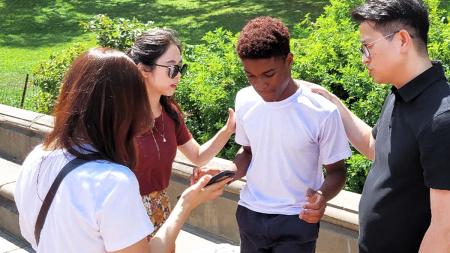Seminary Conference Explores Loving Your Migrant Neighbor

Jesus told his disciples that the first and greatest commandment was to love God. The second was nearly as important — to love your neighbor as yourself. From July 30 through August 1, 2018 several professors, pastors, ministry leaders and lay leaders considered what this second commandment means in today’s society.
Titled “Loving your neighbor,” this conference was hosted by Calvin Theological Seminary and explored what it means to love your neighbor especially when that neighbor is a refugee, immigrant, or migrant.
“Each year, thousands of people arrive in the United States and Canada as refugees or immigrants. Some refugees are children who arrive as unaccompanied minors, having been separated from their families abroad as they fled violence or disaster. How does the Bible help us navigate in this time and place?” the conference website asks.
Subtitled “Ministry Among Migrants, Immigrants and Refugees,” the conference included those who work with migrants, immigrants and refugees. It also offered presentations from keynote speaker Paul C.H. Lim, associate professor of the History of Christianity at Vanderbilt University Divinity School.
Lim opened the conference on Tuesday morning by looking at John Calvin’s views on Christian love and mercy for those living in alien lands. Calvin, himself, was a refugee from France, who fled to Geneva, Switzerland, because of his critical views of aspects of Roman Catholic teaching.
“Calvin was a resident alien of Geneva until five years before his death,” said Lim. “Calvin taught that you should not just invite the wealthy and the powerful into your home, but you should also think about the needy who are in need of hospitality and an embrace.”
Considering the struggle over immigration in the U.S. today, Lim thinks Calvin would have some things to say.
For instance, at one point, Calvin wrote about health care for the widow and orphan: “It would be good, not only for the poor of the hospital, but also for those of the city who cannot help themselves, that they have a doctor and a surgeon of their own who… [will] be required to have care of the hospital and to visit the other poor.”
About the refugee: “Moreover, besides the hospital for those passing through which must be maintained, there should be some attention given to any recognized as worthy of special charity.”
This theology, said Lim, comes straight from Hebrews 13: 1-2 that says: “Keep on loving one another as brothers and sisters. Don’t not forget to show hospitality to strangers, for by doing so some people have shown hospitality to angels.”
And Jesus Christ, a stranger who came to live among us as God, taught that we should welcome those different than us, especially the poor. “This is the lense of this conference,” said Lim. “How are we in the 21st century going to be followers of Jesus Christ?”
Kate Kooyman, the justice and education team leader for the CRC’s Office of Social Justice, said she has appreciated what she has learned and heard at the conference. A presentation by Bethany Christian Services on providing shelter for refugees, she said, was very moving.
In addition, she said she didn’t know, until listening to Lim, how important hospitality was for John Calvin, who himself was a refugee.
“The issues of today are deeply woven into the character and history of Reformed Christians, and we have so much to learn from Calvin's story and passions for the immigrant and refugee," she said.
After Lim, Bernard Ayoola, director of the African Resource Center of West Michigan, spoke of the many ways in which his organization and churches in the area have reached out to the hundreds of Africans who have moved to the area over the years.
He also said that West Michigan is currently home to at least 44 African churches and fellowships. “This is an amazing number,” he said.
Following Ayoola, Mariano Avila, New Testament professor at Calvin Seminary, opened his presentation by playing a tape coming from a U.S. immigration enforcement detention center where authorities had been ordered to separate refugee families.
“This is the horror of what migrant children in the U.S. are suffering,” said Avila. “Listen!”
Playing on YouTube, the voices recorded in the center in Brownsville, Texas, came in clear:
“Daddy! Daddy!”
“Mommy!”
Sounds of children crying could be heard, during which a man said: “Well, we have an orchestra here.”
There was more crying for parents.
After the tape played at the conference, Avila offered several quotations from the Bible to highlight what scripture has to say about how we should treat the migrant and refugee among us.
Displayed on the screen in the front of the room in the seminary auditorium was this verse from Lamentations 4:1-2.
“How the gold has lost its luster, the fine gold become dull! The sacred gems are scattered at every street corner. How the precious children of Zion, once worth their weight in gold, are now considered as pots of clay, the work of a potter’s hands!”
Avila then introduced three speakers, two from Mexico and one from El Salvador. One is a CRC pastor, another an elder in a CRC congregation, and the third a leader in a CRC congregation. Given the sensitivity of the topic, they didn’t want their names or churches used. All, however, spoke of how the gospel and its commands to love our neighbors seems to be at odds with some prevailing attitudes in society and even churches today.
They told sobering stories of a refugee father deported and leaving behind minor children to fend for themselves, of refugees living without furniture in cold basements, of refugees only able to eat because of food donated from a church, and of refugees willing but unable to work and go to church because they have no transportation or opportunity to get a driver’s license.
Asked how she felt after hearing those voices from the detention center on YouTube, the leader of the CRC congregation couldn’t hide her anger. “Sadness, frustration and rage because of the cruelty of this culture in refusing to embrace immigrants and tearing mothers away from their children.”
The CRC pastor recalled how people, in recent months, boldly approach him and ask when is he going to go back to where he came from. “In this country we are second-class citizens. People leave their homes hoping for a better life in this country, but families are marginalized.”
The CRC elder said she strongly supported the theme of the conference because, for her, loving one’s neighbor is what her faith is all about. The suffering she has seen, the isolation people feel, and the things that other Christians have said have hurt her deeply.
“We need as churches to learn to love our neighbors, especially today,” she said. “We must equip ourselves to continue calling out to God for help.”
Reflecting on the conference, Colin Watson, Sr., the CRCNA's director of ministries and administration, said: "I was particularly moved by the depth of the biblical and theological grounding for engagement with immigrants and all members of our respective communities given by the presenters. This was a truly worthwhile and life-giving experience."


